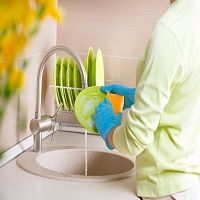Article
Do Dishwashers Contribute to Kids' Allergies?
Author(s):
Washing dirty dishes by hand seems to help curb food allergies in children.

Washing dirty dishes by hand seems to help curb food allergies in children.
The finding, based on a questionnaire from the International Study of Asthma and Allergies, was published in the journal Pediatrics, involved 1,029 children ages 7 and 8 from Kiruna, north of Sweden, and Mölndal, on the southwest coast of Sweden. The study questions specifically targeted asthma, eczema, and rhinoconjunctivitis.
Results indicated hand-washing dishes directly correlated to the reduced risk of allergic disease development (multivariate analysis, odds ratio 0.57; 95% confidence interval: 0.37—0.85). Furthermore, there was a significant risk reduction in a dose-response pattern if the children were also served fermented food and if the family bought food directly from farms.
Commenting on the study, Punita Ponda, MD, assistant division chief of allergy and immunology at Cohen Children’s Medical Center in New Hyde Park, NY, said it makes sense.
The research addresses the so-called “hygiene hypothesis,” Ponda said.
“If your environment is very hygienic, too hygienic where there is very little bacteria that naturally would have been there [because you got rid of it], that then you become predisposed to having food allergies or other types of allergies.”
According to Ponda, the thought is that while hand-washing dishes wouldn’t produce nearly as bacteria-free results as would using the dishwasher, being exposed to those natural bacteria would prevent a predisposition to certain allergies.
Thoroughly studying the hygiene hypothesis, Ponda is observing how bacteria in a person’s gut have changed over time and its relationship to food allergies. It’s imperative for families to consider the threshold they’d cross to keep a strictly hygienic home. For instance, frequently using antibacterial soap could potentially spur a child’s allergies, since natural bacteria are being eliminated.
“The balance is different for each family,” Ponda said. “There is evidence this study brings up that hand washing is helpful, but if you’re not spending as much time with the kids, well is that really what you want to do when we don’t know for sure that that is going to make them avoid food allergies?”
As the study results concluded, “In families who use hand dishwashing, allergic diseases in children are less common than in children from families who use machine dishwashing. We speculate that a less-efficient dishwashing method may induce tolerance via increased microbial exposure.”





